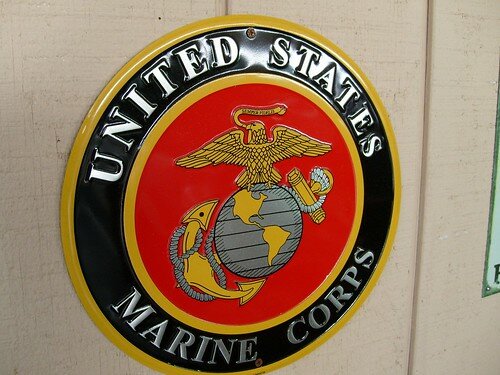If you happen to take my advice and give this book to someone, be careful to whom you give it; there may be unintended consequences. All three of our children loved the book, especially knowing how much it tracked the WWII experiences of their “Grandpa Barrow,” who like Uris, served in the 6th Marines, 2nd Marine Division. For all three, it was part of the inspiration to join the JROTC program in high school. For our oldest, that didn’t lead to the Marine Corps, but it did lead to West Point, deployments to Afghanistan and Iraq, the Meritorious Service Medal, and the Bronze Star – and that was a daughter.
Leon Uris, the author of BATTLE CRY, dropped out of high school at seventeen to join the Marine Corps right after Pearl Harbor. His limited formal education, combined with his experience in two of the three battles depicted (Guadalcanal and Tarawa) gives the story a “tell-it-like-it-was” authenticity lacking in more polished novels. The first third of the novel is set in boot camp at Camp Elliot in San Diego and subsequent training. Though some critics find this drawn out, it is essential to an understanding of what makes the United States Marine, whatever his civilian background, a unique fighting machine, capable of not just bravery but of improvising and overcoming the worst odds imaginable. (Another large portion of the book is dedicated to the personal and love lives of half a dozen Marines, and this, unfortunately, is overdone in the film version.)
The narration begins like Moby Dick, with “They call me Mac.” He is a grizzled Master Sergeant who has:
“…sailed the Cape and the Horn aboard a battlewagon with a sea so choppy the bow was awash half the time under thirty foot waves. I’ve stood legation guard in Paris and London and Prague. I know every damned port of call and call house in the Mediterranean and the world that shines beneath the Southern Cross like the nomenclature of a rifle. I’ve sat behind a machine gun poked through barbed wire that encircled the International Settlement when the world was supposed to have been at peace, and I’ve called Jap bluffs on the Yangtze Patrol a decade before Pearl Harbor.”
Mac still wonders himself how the WWII influx of recruits, “a gang of beardless youths of eighteen, nineteen and twenty who’d get pickled on two bottles of brew” would form the units (this one colorfully named “Huxley’s Whores”) that would strike fear into the heart of the Japanese Empire. “God knows we never thought we could do the job with them… God knows they fooled us.” There was the high school football hero, the Native American, the country boy Texan, the big lumberjack with two left feet, and the academic (who, like Teddy Roosevelt, also happened to be a proficient boxer, much to the chagrin of the streetwise Mexican, who would soon become his unlikely best buddy). All would pay a price – some the ultimate price – but all would be Marines.
BATTLE CRY makes no maudlin appeals to high minded ideals. These boys rarely talk of why, in a larger sense, their nation is at war. They do what they do – age quod agis – even what seems superhuman, out of love for their fellow Marines and the Corps that binds them.
Finally in action at Guadalcanal, a recon patrol is sent deep into the jungle with radios to locate enemy movement, but it is the patrol that is spotted by a Japanese battalion, working themselves up to a Banzai charge. Two Marines are instantly wounded, one through the knee. There is no way he can walk back, and no way he can be carried back up the slippery jungle slope from whence they came. They would all die in the attempt, and any attempt to escape at all would need covering fire. He is given morphine, but does not want too much, given the task at hand:
“You comfortable, Ski?” Pedro asked.
“Yeah.”
“I shall pray for your soul each night.”
“Pray for your own ass. I know where I’m going.” Pedro disappeared into the black night. Ski was alone.
“They must be all safe now, on the ridge, he thought… never fired this damned BAR but once… hope I can remember… pain coming back…” His wet finger slipped to the trigger as the grass before him began to stir. “Hail Mary… Mother of God… pray for us… now and at the hour of our death…”
“Marine! You die!”
The 6th Marines hit Green Beach at Tarawa in November of 1943, but this is a reinforcement landing – bloody enough though the action is. The Battle of Saipan the following summer is where they faced decimation. Here is Uris at his finest:
“As the stunned Marines braced for the death they knew must come, Two Gun Shapiro stepped in front of them, his two pistols smoking. He turned to his Marines and over the din they heard a ghastly shriek from his lips. ‘Blood!’ he cried. Max Shapiro sank to his knees, his pistols empty. He threw them at the enemy. ‘Blood!’ he screamed, ‘Blood!’… A legend was broken! The invincible Captain, the man bullets could not touch, the man they believed was almost divine, lay there writhing in agony the same as any human being. The blood gushed from his mouth and ears and nose and he rolled over defiantly, trying to crawl to his enemy to kill them with his bare hands, the same ghastly word on his lips. Was he human after all?…
“Huxley’s Whores rose to the heights of their dead captain. They no longer resembled human beings. Savage beyond savagery, murderous beyond murder, they shrieked, ‘Blood!’ ‘BLOOD!’… ‘BLOOD!'”
“The enemy, who were mere mortals, fell back.”
“HELLO, TULSA WHITE; THIS IS MCQUADE, FOX COMPANY. WE HAVE STOPPED THEM. WE HAVE STOPPED THEM.”
For those interested in the grim reality of Saipan, it forms a good portion of this episode of World War II in HD called Day of Days:
At about 22 minutes in, that’s my father in the flame throwing tank.
A few years before he died, he took me to a concert of the bands of the Black Watch and the Coldstream Guards. The Guards played a salute to American armed forces, playing all their hymns but one.
“Sorry they left you guys out, dad.” I said.
“They’re saving the best for last.” he answered.
Sure enough, the place grew dark, then the spotlights shown upon two flags held high by a mixed color guard of Marines and Highlanders of the Black Watch – the Union Jack stood side-by-side with old Glory. As they sallied forth, the pipes struck up the hymn I had memorized every verse of by the time I was six:
From the Halls of Montezuma…
My father shot to his feet, a tear of pride upon his cheek. Here and there throughout the audience men stood up; some elderly and struggling to do so.
Once a Marine, always a Marine.
****
Photo by CapCase 



Comments